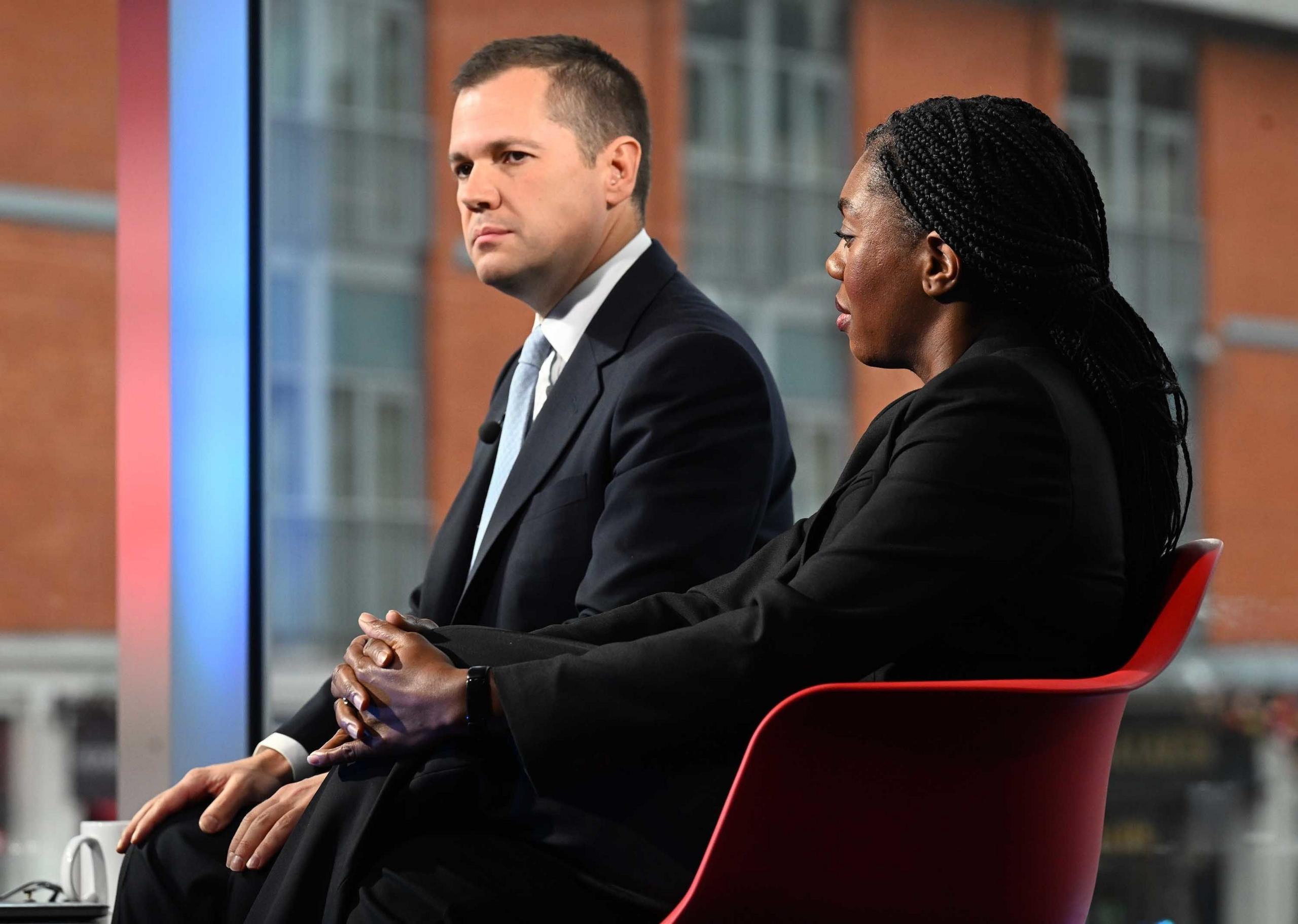Badenoch and Jenrick at odds on tackling immigration

- Published
Immigrants who bring "foreign conflicts" with them should not be welcomed to the UK, Conservative leadership contender Kemi Badenoch has said.
She told the BBC's Sunday with Laura Kuenssberg she believed in "western values, the principles which have made this country great, and I think that we need to make sure that we continue to abide by those principles, to keep the society that we have now".
As the Tories begin their party conference in Birmingham, leadership rival Robert Jenrick told the same programme immigration was at the top of his list of issues to fix.
He said the UK needed to leave the European Convention on Human Rights to resolve the problem, a move Badenoch has not signed up to.
Two other candidates remain in the Conservative leadership contest - shadow home secretary James Cleverly and shadow security minister Tom Tugendhat.
All four will use the conference, which ends on 2 October, to present their cases to Tory activists.
After Parliament returns, Tory MPs will narrow the field down to two candidates in votes on 9 and 10 October, before party members are balloted on their choice.
A winner and successor to Rishi Sunak will be announced on 2 November.
Not all cultures equally valid, says Kemi Badenoch
- Published29 September 2024
After 'lacklustre' contest, next Tory leader has five days to prove their worth
- Published28 September 2024
Conservative leadership: Who are the candidates?
- Published22 October 2024
Badenoch used an article in the Sunday Telegraph, external to argue the country expected immigrants to share the UK's values.
"We can not be naïve and assume immigrants will automatically abandon ancestral ethnic hostilities at the border, or that all cultures are equally valid. They are not," she wrote.
The two frontrunners in the leadership campaign have disagreed over how best to reduce immigration, an issue which many Tories believe caused millions of voters to desert the party for Reform UK in July's general election.
In his interview with Laura Kuenssberg, Jenrick took issue with Badenoch's emphasis on culture.
Stressing his commitment to capping net migration in the tens of thousands, he said: "Numbers also matter.
“Just saying ‘I’ll have a plan in a few years’ time’ is a recipe for in-fighting and for losing the public’s trust. I have a plan."
Badenoch accused him of misrepresenting her position, saying numbers did matter but "culture matters even more. Who comes into the country is absolutely critical."
Asked which cultures were "less valid", she said it was "not about labelling cultures".
"I think that cultures where women are told that they should not work, I would knock on doors... and you would see somebody at the door who says 'I can't speak to you, I will get my husband'. I don't think that is as equally valid as our culture."
Badenoch, who was born in London but spent much of her childhood in Nigeria before returning to the UK, added she did not want "this place to turn into the place I was running away from".
Binding cap
The shadow communities secretary called for a better integration strategy for immigrants which emphasised British values, to "make sure that we have a shared culture and a shared identity".
"It is our job to make sure that the people who come into the country are people who love this country, who want it to succeed."
Jenrick, who resigned as immigration minister from Sunak's cabinet, used his interview to stress the need to put a legally-binding cap on immigration numbers, saying otherwise politicians would "continue to let the public down”.
Asked if he would be willing to leave jobs unfilled in order to bring down numbers, he said: “I don’t think that’s going to happen… but if you’re asking me would I prioritise this, yes I would.
"I don’t pretend that ending this era of mass migration is going to be plain sailing."
Speaking later at a fringe event at the Tory conference, Jenrick said immigration had become an "existential issue" for his party.
If he became leader, he added, it would be his job not to attack or do a deal with Nigel Farage's Reform UK - but "to put it out of business" by settling the Conservatives' position on immigration.
Tugendhat told the same audience a key challenge was to increase productivity to achieve "real growth", rather than relying on migration to boost economic output, which he said offered only the "illusion" of growth.
Questioned on Sky News about the Conservatives' worst-ever general election defeat in July, Cleverly said the public "didn't like the constant infighting" or the "bickering" in the party.
"They didn't like the fact that as soon as someone became prime minister, there were people within the party who set about removing them as prime minister.
"We didn't do that just once or twice. We did it over and over again. The British people told us that they wanted us to think about them, not to think about ourselves."
Also on Sky News, Tugendhat pointed to his record in the military and other public service to "demonstrate" his "character".
Asked if the Tories needed another "posh boy leader from a great public school", he said: "I think the Conservative Party needs a leader who can lead, and you can judge me on the decisions my parents made 35 years ago or you can judge me on the decisions I have made for the last 35 years.
"I have chosen consistently to serve our country. I have put myself on the front line in Iraq and Afghanistan."